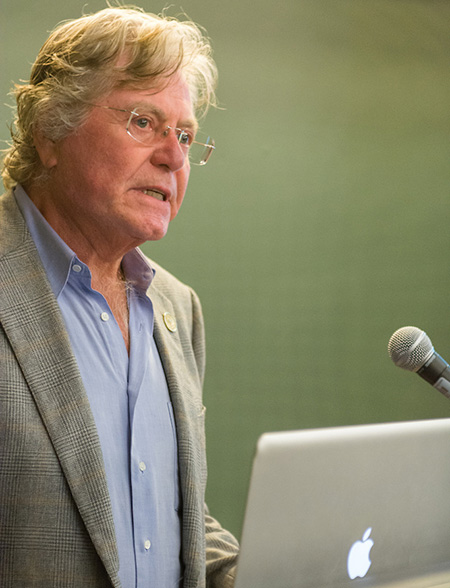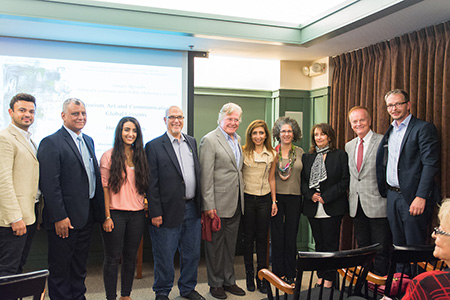Terrorism detriment to art, says Fahmy
Critically acclaimed Egyptian actor, director, and political activist Hussein Fahmy spoke with students in the Beard Room on September 29 to discuss the effects of terrorism on art and communication.

Egyptian actor and activist Hussein Fahmy spoke to Emerson students about the effects of terrorism on art in a lecture in the Beard Room on September 29. (Photo by Michelle Kwong '15)
Fahmy, who has acted and directed in more than 70 award-winning films, addressed concerns with the current state of the artistic community, the dissemination of messages through art, and the role of the millennial generation in today’s artistic progression in spite of terrorism.
The 74-year-old spoke openly about the effects of terrorism on his acting and theater career as a performer in the 1990s in Egypt. “I was asked by the security police to carry my own gun,” Fahmy said.
The actor also discussed the psychological toll that terrorism posed in his career. “When you feel that you are being threatened, you cannot move, you cannot think, you cannot even perform your ideas,” said Fahmy.
He continued, “Terrorism is not only physical, it is also mental and this causes a lot of pain. You’re standing on that stage, delivering a very important message, yet you are being threatened not to deliver that message.” In spite of threats, Fahmy continues using art to spread political messages he believes are relevant.
Growing up in a nation that has experienced two revolutions and did not welcome artistic expression, Fahmy said that he was happy his audiences were largely university students, whom he believes play an integral part in progression while terrorism is so rampant. “I was so happy to see at that time that the upper seats were all full of students, university students. They were there and they wanted to listen to us, “ he said.

Emerson community members and guests pose for a photo with Hussein Fahmy after his lecture in the Beard Room. From left, Rayan Albakri, Communication Studies faculty member Mohamed Khalil, Rand Algosaibi-Bakr '18, James Statman, Hussein Fahmy, Rana Algosaibi, Amy Ansell, dean of the Institute of Liberal Arts and Interdisciplinary Studies, Fatima Algosaibi, Greg Payne, interim chair of Communication Studies, and Joachim Kuss. (Photo by Michelle Kwong '15)
Fahmy reminded Emerson students that a “humanitarian is a person who is ready to serve humanity.”
Having worked for the United Nations for nine years as an ambassador of Goodwill for the UN Development Program, Fahmy later resigned due to the war against Lebanon.
“If you have an umbrella [organization] and you disagree with that umbrella in any way or any form, either you lie to yourself and you continue or you resign,” he said.
Fahmy is adamant that students do not need to serve under the umbrella of an organization to ignite change. He said that students should instead remain independent, maintain their self-expression, and find others who share similar beliefs.
Emerson’s Communication Studies faculty invited Fahmy to speak on campus.
Categories